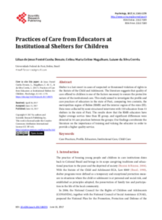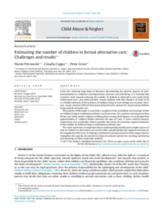Displaying 851 - 860 of 1482
This presentation describes the issue of violence against children in alternative care settings in East and Southern Africa and offers recommendations on how to strengthen the care workforce to ensure it is equipped to prevent and respond to violence against children in alternative care.
This presentation provides an overview of violence against children in residential care facilities in Africa.
This presentation provides an overview of child protection issues and care reform in Ghana.
This study aimed to investigate the profile and care practices of educators teaching at institutional shelters for children in the state of Pará, comparing two contexts, the metropolitan region of Belém (RMB) and the interior region of the state (IE).
The aim of this study was to compare outcomes for children living in three different types of care in Chile: biological parental care, residential care, and foster care.
This paper highlights some of the challenges of reforming child care policy and offers recommendations to advance the political priority of care reform at the national level.
Produced by UNICEF, this article provides an estimate of the number of children living in institutional care worldwide.
This study compares the level of social competence and quality of life among orphans and non-orphans.
This paper explores the question: What does the literature tell us about how many children worldwide are in institutions/orphanages; how likely they are to be exploited and in which ways; and what interventions are most effective in preventing this?
This statistical first release provides data on secure children’s homes (SCHs) in England and Wales.








